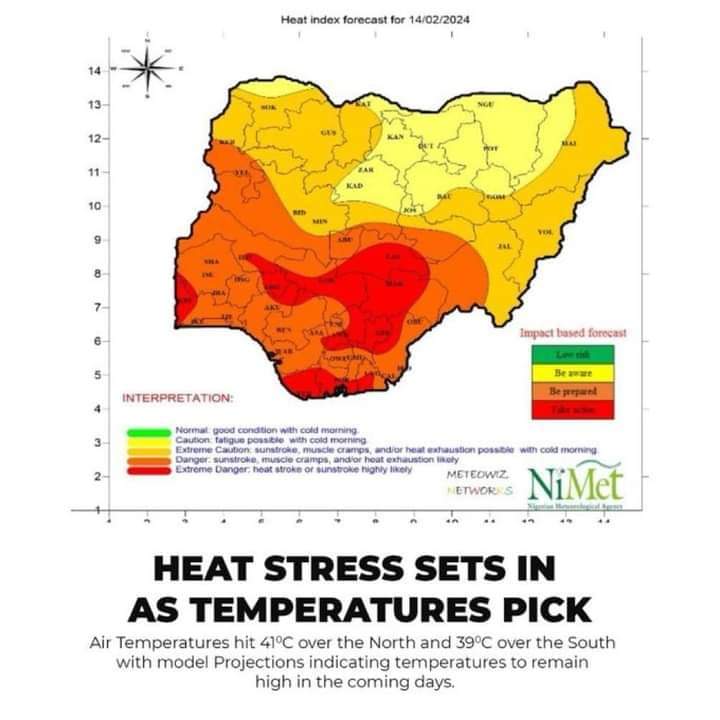CliqJets Consulting
Fostering Growth, Innovation, and Sustainability in Airline Operations
Navigating Heat Stress: Ensuring the Well-being of Airline Ground Operation Officers in Nigeria
As temperatures soar across Nigeria, reaching a scorching 41°C in the North and 39°C in the South, Nigeria, with its diverse climate, is no stranger to scorching temperatures and heat stress, especially during the dry season. In recent years, however, the country has experienced a noticeable increase in temperature, leading to adverse effects on various sectors, including aviation. Among those affected are the hardworking ground operation officers who tirelessly ensure the smooth functioning of airline operations. As temperatures rise, so do concerns about heat stress and its impact on the health and performance of these essential workers. In this article, we delve into the challenges posed by increased temperatures on airline ground operation officers in Nigeria and explore strategies to combat heat stress, particularly through proper hydration.

Understanding Heat Stress
Heat stress occurs when the body’s ability to regulate its internal temperature is overwhelmed by external heat. For ground operation officers, prolonged exposure to high temperatures and physical exertion can lead to dehydration, fatigue, dizziness, and even loss of consciousness. Additionally, individuals vary in their susceptibility to heat stress based on factors such as age, fitness level, and pre-existing medical conditions.
The Impact of Increased Temperature on Airline Employees
Ground operation officers play a crucial role in ensuring the safety and efficiency of airline operations. From baggage handling to aircraft maintenance, these employees are often exposed to the elements for extended periods, making them susceptible to heat-related illnesses. With rising temperatures becoming a norm, the risk of heat stress among airline employees, especially those working on the tarmac, is exacerbated.
Heat stress occurs when the body’s cooling mechanisms are overwhelmed by heat, leading to symptoms ranging from mild discomfort to severe conditions like heat exhaustion or heatstroke. High temperatures, humidity, and physical exertion can quickly push individuals past their limits, affecting their ability to perform their duties effectively and putting their health at risk.
Heat Stress: Tips for Staying Hydrated and Safe
- Drink Plenty of Water: Hydration is paramount in combating heat stress. Ground operation officers should consume water regularly throughout their shifts, even if they do not feel thirsty. Avoid excessive intake of caffeinated or alcoholic beverages, as they can contribute to dehydration.
- Electrolyte Replacement: In addition to water, replenishing electrolytes lost through sweat is essential. Consuming sports drinks or electrolyte tablets can help maintain the body’s electrolyte balance and prevent muscle cramps.
- Schedule Breaks in Shade: Where possible, allocate time for rest breaks in shaded areas to allow the body to cool down. Avoid prolonged exposure to direct sunlight, especially during the hottest parts of the day.
- Wear Lightweight, Breathable Clothing: Choose lightweight, breathable fabrics that allow sweat to evaporate, aiding in the body’s natural cooling process. Wearing a wide-brimmed hat and sunglasses can also protect from the sun’s rays.
- Monitor Symptoms: Be vigilant for signs of heat-related illnesses among colleagues, such as excessive sweating, nausea, headache, or confusion. Promptly seek medical attention if symptoms arise.
Conclusion
As Nigeria grapples with the ramifications of rising temperatures, safeguarding the well-being of airline ground operation officers becomes imperative. By implementing practical measures to mitigate heat stress and prioritize hydration, both employers and employees can ensure a safer and more sustainable working environment in Nigerian airports. It is crucial to foster awareness, provide adequate training, and enact policies that prioritize the health and safety of frontline workers amidst evolving climatic conditions.





0 Comments